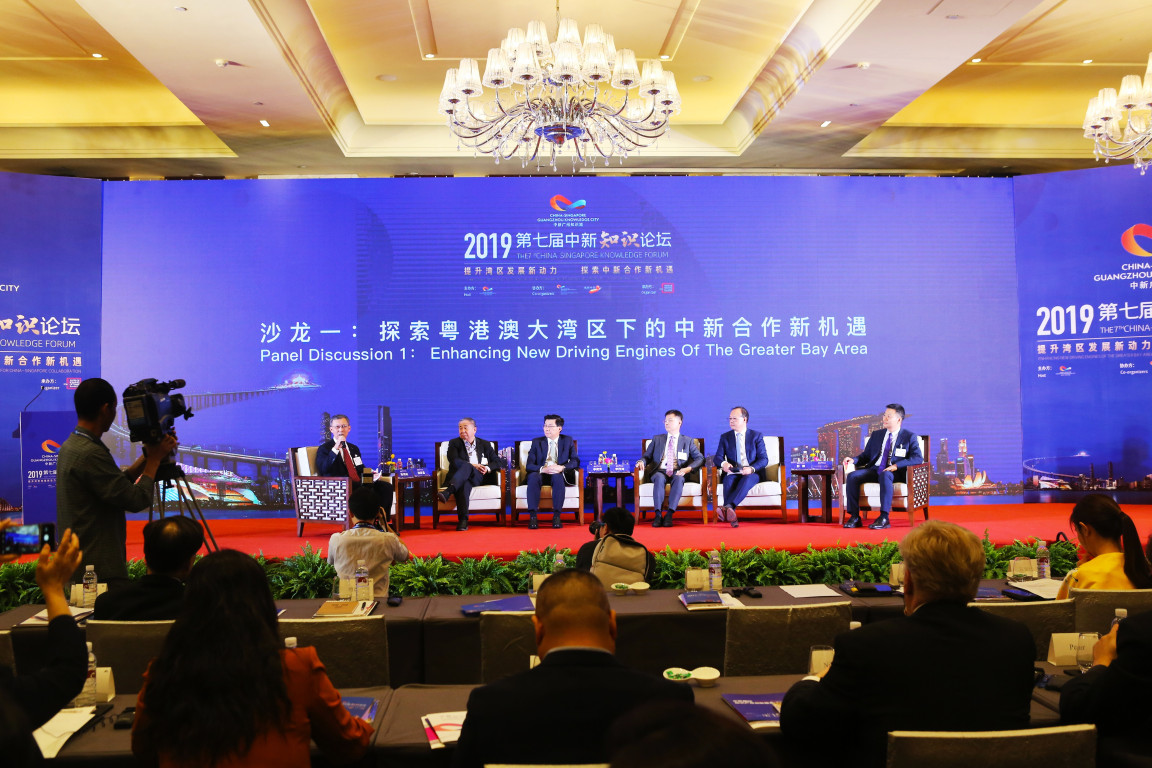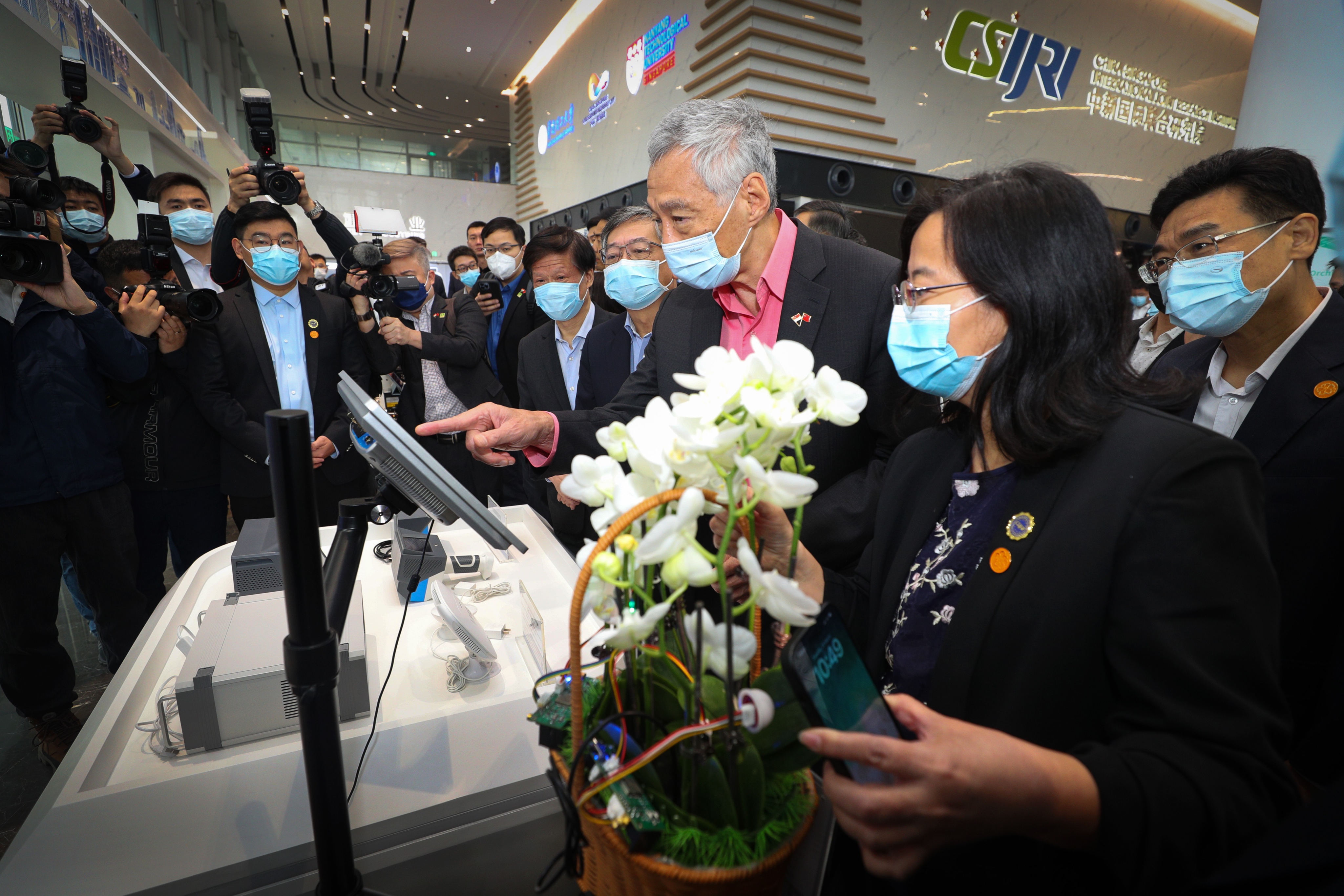Singapore Prime Minister Lee Hsien Loong arrived in Guangzhou, the capital city of Guangdong, on March 27 as the first destination of his official visit to China.
The PM’s delegation comprises Foreign Affairs Minister Vivian Balakrishnan, Trade and Industry Minister Gan Kim Yong, as well as Health Minister Ong Ye Kung, who is also the co-chair of the Singapore-Guangdong Collaboration Council. This indicates the practical goal to strengthen economic ties with China, especially Guangdong, its largest provincial trade partner.
Analysts believe the PM’s visit to Guangzhou sends a clear signal that the Guangdong-Hong Kong-Macao Greater Bay Area (GBA) will be a key focus in the bilateral cooperation, considering it is the place where the delegation can catch up with the latest industrial and technological trends of China while also being a vital partner that they need to tighten communication and cooperation for strategic position and economic recovery.
Kishore Mahbubani, Distinguished Fellow at the Asia Research Institute of the National University of Singapore, had an interview with GDToday on March 28.
GBA considered a strategic region for technological cooperation
“Prime Minister Lee was interested in our minibuses and cloud control platforms, and paid great attention to our technical personnel during the visit,” a staff member of WeRide, one of China’s leading autonomous driving companies, told GDToday after they gave the delegation an autonomous bus ride around the Guangzhou International Bio Island on the afternoon of the 27th.
Singapore and Guangdong are highly complementary for cooperation in the tech sector, especially in autonomous vehicles, according to WeRide. The application of autonomous vehicles is an aim of Singapore’s Smart Nation Initiatives, while Guangdong is home to leading autonomous driving companies, and its output of auto industries has exceeded 1 trillion RMB.

WeRide's autonomous minibus[Photo/Nanfang Daily]
Accordingly, WeRide established a branch in Singapore and received investments from K3 Ventures, a Singaporean capital firm, and Strides, a subsidiary of SMRT’s urban mobility services, in 2022. It will trial autonomous vehicles, such as its minibus, taxi and road sweeper, in Singapore in 2023.
“Many R&D engineers of our company have an education background in Singapore, as the country has a large talent pool in high-tech. Moreover, we are in the process of applying for incentives such as tax reduction and R&D subsidy that Singapore launched for the industry,” according to WeRide.
Li Shufei, Acting Director of ASEAN-Greater Bay Area Research Institute, believes that the delegation’s visit to Guangdong indicates the province is a strategic area for technological cooperation.
“With a large number of tech companies, including Huawei and BYD, they could gain insight into the latest technological development of China and tight potential partnerships, which enables them to maintain the strategic position and excels their global counterparts,” said Li.
Emerging industries key to future growth of Singapore, Guangdong
Visiting companies in emerging industries have been a routine in all the Prime Minister’s trips to Guangdong. “Every time I visit Guangdong, I see new changes,” Lee commented during his trip in 2014.
The companies he visited during this trip cover sectors of information technology, new energy and bio-medicine, which aligns with the strategic areas he highlighted for bilateral cooperation: digital economy and green development.

The China-Singapore Knowledge Forum is held on an annual basis for cooperative potential between Singapore and Guangdong in emerging sectors. [Photo/Nanfang Daily]
Now that Singapore is under stress brought by the looming recession in Europe and the shaky US economy, analysts believe China, especially Guangdong, its economic powerhouse, can provide significant opportunities for economic growth, and Guangdong will be an ideal region to implement cooperation in the strategic areas.
Statistics show Guangdong accelerated economic recovery in the first two months of 2023 as the total retail sales increased 1.8 percent to 790.97 billion RMB, while the catering revenue soared 18.8 percent.
With Guangdong’s vow to high-quality development and emphasis on sustainable and environmentally-friendly growth, cities such as Guangzhou, Shenzhen, Foshan and Dongguan started planning and launching high-tech and advanced manufacturing projects this year. The investment in the two areas grew 33.5 percent and 25.1 percent, respectively, which is expected to secure the development of emerging industries.
In addition, Singaporean investors show greater interest in cooperation with Guangdong in such areas as advanced manufacturing, bio-tech, intellectual property, cross-border finance and smart cities, according to Lee Yi Shyan, Chairman of Business China, at a forum in November 2022. “The total investment from Singaporean enterprises to Guangdong increased 10 percent and reached 8.3 billion RMB, even under the COVID-19 pandemic,” he said.
Li Shufei suggested the governments of Guangdong and Singapore could pay more attention to the cooperation in emerging industries to seize the opportunities brought by the latest industrial landscape and play a more vital role in ASEAN-GBA regional ties, especially in the strategic areas for bilateral cooperation.
“The GBA is frequently emphasised by government representatives in discussions of China-ASEAN cooperation. Through mechanisms like the Singapore-Guangdong Collaboration Council and with more consideration for the alignment of the industrial chain and innovation chain in the larger ASEAN-GBA region, Singapore-Guangdong cooperation could be advanced more thoroughly,” said Li.
Bilateral platforms tightened partnerships in knowledge economy and smart city
On March 28, Lee and his group paid a visit to the China-Singapore Guangzhou Knowledge City (CSGKC), where they received an update on the status of their state-level bilateral cooperation project. This is the second time Lee has visited the project.

Lee Hsien Loong visits CSGKC [Photo/Lee Hsien Loong’s official twitter account]
Founded in 2010, CSGKC features bilateral collaboration in urban governance. Ong Bee Hong, deputy CEO of CSGKC Investment and Development Co. Ltd, told GDToday that the Singapore and China sides constructed the project from the ground up and adopted foreseeing concepts such as city-industry integration and sponge city in urban planning.
With the infrastructure being implemented, CSGKC has catalysed economic and investment cooperation. It lured more than 24 thousand companies to settle, with total registered capital of about 5 billion RMB as of 2022. More than 60 China-Singapore cooperative projects have landed here.
In addition, CSGKC helps expand bilateral cooperation in the knowledge economy. China-Singapore Smart Park, a major project Lee and his delegation visited on their trip, was launched in 2022, and is positioned as the first choice for Singaporean enterprises to enter South China. Thus far, more than 60 companies in the digital economy, green development and bio-medicine have settled in the park, including companies incubated by A*Star, the biggest research institute in Singapore.
Apart from CSGKC, Singapore and Shenzhen launched the Singapore-China (Shenzhen) Smart City Initiative (SCI) to leverage the technological strengths of the two sides and enable digital transformation, cooperative development and talent training. In 2022, 14 cooperation projects were selected through SCI, which has doubled compared with 2021.
Loh Tuck Keat, Consul General of Singapore in Guangzhou, said the two major projects between Singapore and Guangdong strongly align with the high-quality development trend in China. He considers them excellent platforms for cooperation through which Singaporean companies could explore opportunities in more dimensions.
Li Shufei believes the continuous growth of the two projects in scale and economic output is attributed to the mutual trust between Chinese and Singaporean leaders and their top-level plans. The Singaporean companies have gained considerable returns on these investments.
“As the digital economy will be a key focus in China-ASEAN cooperation, the partnership between Singapore and Guangdong could be a model to lead regional cooperation,” said Li.
Reported by Jasmine
Edited by Zhao Yang, Wing, James
Video by GDToday
















